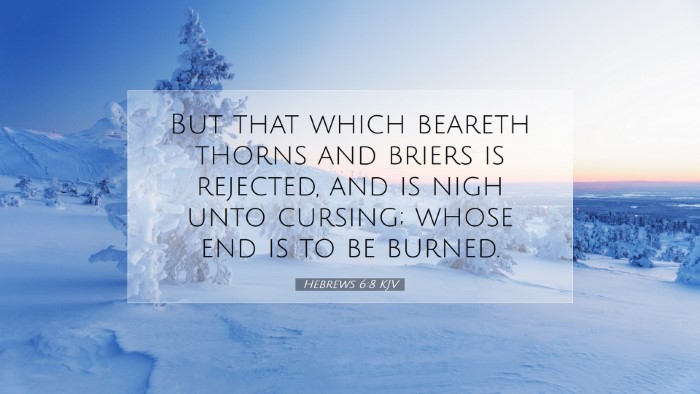Old Testament
Genesis Exodus Leviticus Numbers Deuteronomy Joshua Judges Ruth 1 Samuel 2 Samuel 1 Kings 2 Kings 1 Chronicles 2 Chronicles Ezra Nehemiah Esther Job Psalms Proverbs Ecclesiastes Song of Solomon Isaiah Jeremiah Lamentations Ezekiel Daniel Hosea Joel Amos Obadiah Jonah Micah Nahum Habakkuk Zephaniah Haggai Zechariah MalachiHebrews 6:8
Hebrews 6:8 KJV
But that which beareth thorns and briers is rejected, and is nigh unto cursing; whose end is to be burned.
Hebrews 6:8 Bible Commentary
Commentary on Hebrews 6:8
Hebrews 6:8 states: "But that which bears thorns and briars is rejected, and is near to cursing; whose end is to be burned." This verse serves as a profound exhortation to the early Christian believers, urging them to reflect on the outcomes of their spiritual condition. The imagery of fertile land producing thorns and briars symbolizes the failure to yield spiritual fruit, which is essential for genuine faith.
Contextual Background
The author of Hebrews addresses a community facing persecution and temptation to revert to former ways. This chapter encourages perseverance and maturity in faith, warning against stagnation and apostasy. The surrounding verses discuss the serious implications of falling away from the faith.
Insights from Matthew Henry
Matthew Henry interprets this verse as a stark warning. He highlights that the "thorns and briars" represent unfruitfulness and constitute the evidence of a life not genuinely connected to Christ. Henry asserts that:
- The imagery of thorns is drawn from the parable of the sower, where the seed that fell among thorns was choked and could not bear fruit (Matthew 13:7).
- It illustrates the danger of a faith that does not produce good works, highlighting that true faith is always evidenced by its fruits.
- Henry emphasizes the severity of being "rejected" — those who do not produce fruit are ultimately destined for spiritual destruction.
Perspectives from Albert Barnes
Albert Barnes elaborates on the consequences of a life that fails to bear good fruit. He points out that:
- The "rejected" land indicates a state of abandonment from God’s favor, illustrating a serious spiritual condition.
- Barnes notes that the use of "cursing" is significant, denoting a complete removal from grace and mercy, akin to the fate of the unfruitful fig tree (Matthew 21:19).
- He emphasizes that this warning should provoke self-examination among believers, reminding them of the importance of spiritual growth and active faith.
Analysis from Adam Clarke
Adam Clarke offers a detailed analysis of the Greek terms used in this passage. He states that:
- The phrase "bears thorns and briars" suggests a lack of cultivation, indicating that neglect leads to spiritual barrenness.
- Clarke highlights that when a person consistently produces "thorns," it reflects a corruption of character and a deviation from the path of righteousness.
- He draws attention to the phrase “whose end is to be burned,” emphasizing that this is a metaphor for divine judgment, underscoring the need for repentance and faith in order to avoid this fate.
Theological Implications
This verse engages with key theological themes surrounding perseverance, judgment, and the necessity of genuine faith. The emphasis on bearing fruit resonates with the teachings of Jesus and the Apostles, who stressed active discipleship.
Maturity in Faith
Believers are called to progress beyond the basics of faith (Hebrews 6:1-3). The warning about producing thorns serves as a caution against complacency within the community and highlights the need for spiritual maturity.
Judgment and Accountability
Hebrews 6:8 posits a serious reminder of the consequences of neglecting one's spiritual responsibilities. The notion of being "near to cursing" conveys that God holds each believer accountable for their spiritual state.
Encouragement for Growth
For pastors and teachers, this passage should serve as a call to encourage their congregations to strive towards holiness and good works, fostering environments where spiritual growth can flourish.
Conclusion
Hebrews 6:8 presents an urgent call for self-reflection on one’s spiritual fruitfulness. Drawing from the insights of Matthew Henry, Albert Barnes, and Adam Clarke, it becomes apparent that the spiritual life is marked by active participation in faith and good deeds. Its warnings linger for the church today, calling out for vigilance in bearing fruit that glorifies God.


